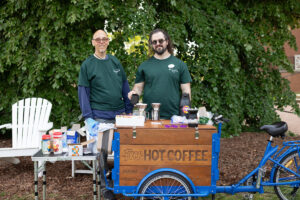This month, Devin Walsh, the University of Mary Washington’s peer recovery specialist, marks off some significant milestones.

Two years ago in May, he committed to a life of sobriety, and the following spring, he began training to help others overcome their own struggles with substances and alcohol, which can often make it challenging for college students to stay in school.
“The University wants to give its students the best opportunity to be successful in college and beyond,” Walsh said. “Being visible and outspoken about my own journey can give them the hope they need to heal and continue to study, learn and grow so they can achieve their goals.”
Founded in 2017, UMW’s Eagles in Recovery program has provided the campus with critical resources and tools to support students, from the sober-curious to those who have experienced active addiction. Bolstered by a Fund for Mary Washington Impact Grant and other sources of funding, Eagles in Recovery also educates and engages the campus community through initiatives such as the coffee bike – providing hot beverages, snacks and outreach – and recovery ally training to teach friends and family how to support loved ones while reducing stigmas surrounding addiction.
“Popular culture has perpetuated the idea that college is the best four-year party one can experience,” said Ray Tuttle, UMW’s health promotions and student success specialist. “But if you’re a person in recovery, and you don’t want to be in that kind of environment, it can be very difficult.”
In 2019, Tuttle helped secure $50,000 as part of the Expanding Collegiate Recovery in Virginia grant, awarded to several schools across the commonwealth by the Department of Behavioral Health and Development Services. The University used the funds to set up a “clubhouse,” a designated safe space in the Link between Randolph and Mason halls, where students in recovery can spend time together in between classes and on weekends, without the risk of being near addictive substances.
Ray and Jiamie Pyles ’23, UMW’s former peer recovery specialist, also earned a Fund for Mary Washington Impact Grant, which provided $5,000 to support the specialist’s position. Piloted by UMW’s Office of Advancement and Alumni Engagement, the Impact Grant program awarded a total of $25,000 in donor-funded grants last spring, ranging from $1,200 to $5,000, to eight projects or initiatives pitched by students, faculty and staff on behalf of recognized campus organizations.